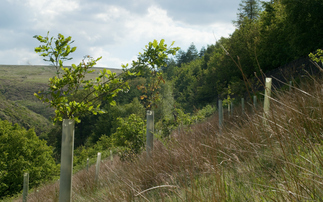Renowned environmental lawyer and Extinction Rebellion campaigner on the journey from 'upright citizen' to law-breaker and green radical
At next week's BusinessGreen Leaders Summit BusinessGreen will publish a new report, in association with Greenhouse PR, featuring interviews with some of the leading green radicals who are working to reshape the economy and our collective response to the climate crisis.
Following last year's 'Meet the Disruptors' report and 2017's 'Secrets of the Pioneers' report, this year's series of interviews features some of the leading green business figures and activists who have embraced a new form of green radicalism in a bid to engineer a step change in the pace of UK decarbonisation.
As a preview to the report we are today publishing our exclusive interview with Extinction Rebellion's Farhana Yamin, the international lawyer turned peaceful protestor who was arrested earlier this year as part of XR's first wave of actions.
Farhana Yamin is an internationally renowned environmental lawyer and Extinction Rebellion activist with more than two decades of experience advising nations and NGOs on climate change and development policy.
As well as authoring numerous books and IPCC reports, she has played a key role in drawing up international treaties, including the landmark Paris Agreement on climate change in 2015. Farhana is also an associate fellow at Chatham House and visiting professor at UCL. In April she glued herself to Shell's London headquarters in protest at the oil firm's climate impact.
Do you think it's important we respond to the climate emergency?
Absolutely. I think the fact that it's not as visible to people in the same way as perhaps another physical threat might be is irrelevant. We're seeing the effects of it all around the world and we really only have a short space of time to start making the fundamental changes that we should have made a long time ago. It's now, basically.
Why do you think we need green radicals at a time like this?
We need to re-examine the fundamental social contract between us and governments, and between ourselves. We need to really question whether the way we set our expectations and run our economy is generating wellbeing and happiness. Because actually, all around us there is evidence it is creating the opposite: anxiety, stress, and the destruction of livelihoods and lives all around the world today, not just in the future. It's important to stop talking about this as a future problem, but to link it to the way current problems are being exacerbated and taking us over the ecological edge. We've not been focusing on the need for systemic change - we've been focusing too much on incremental solutions, such as ad-hoc initiatives delivered by one or two companies, or waiting for some technological silver bullet.
How would you define a 'green radical'?
For me it means linking the root causes of why we have an ecological crisis with the social and economic systems we find ourselves in, and examining why politics has been unable to deal with those underlying problems. So the radical part is about making the broader connection with the economy, because it's basically been out of kilter with nature.
Do we need to redefine markets?
Yes, but even more than that we have to reconsider what the point of the economy is. I'm very influenced by Kate Raworth's Doughnut Economics-type thinking, that we normally just don't think about what the fundamentals of our system and its values really are. The point of economic activity is to secure wellbeing and the human rights of everyone, so everyone can flourish. And if the system is continually letting down huge sections of the population, squeezing them out of prosperity forever, diminishing their life chances, and causing absolute havoc and destruction all around the world - just to give a few people the prospects of prosperity - that system is not a good system and needs to be overhauled. Social justice and wellbeing is not what is being delivered right now.
Do you regard yourself as a green radical?
I think I've shifted and I'm now very happy with that label, because it describes the reality of what we all need to do. It's not a fringe thing, where I'm someone stepping out of the system. I've been trying for 30 years through market mechanisms and changes to policy frameworks to get to the point where we take action. But in fact those 30 years have shown it is by and large almost impossible to change the system unless you work in a systemic way and challenge the root. It's no good just pruning a branch here or there. Given the system itself is not delivering, it's actually time to do a bit of major surgery, and I would say destroy that tree completely and start with a new one.
How have you taken a radical approach to climate action?
I've decided to devote half of my professional life and time for free, including to Extinction Rebellion for example, and to bring them all of the skills, talents, networks, and resources that I can generate myself. I also work for Greenpeace UK as a trustee, and at [cultural climate charity] Julie's Bicycle as a trustee, and I'm on the advisory board of WWF. For me it is a very fundamental choice for me not just to build my own little empire or concentrate on keeping my own NGO, Track 0, going, as important as that is for me.
I'm in a fortunate position that I can make that decision. But I think everybody needs to ask: what can I do in my workspace? Can I change and become an advocate for the restoration of nature? Because in our lifetime we are seeing the greatest injustices and failure of human rights across the world. For me that means doing something a little bit different than going about our day job.
How do you build a business case for radical change?
Businesses just need to see what their future customer wants - those seven million people who walked out and joined the global climate strike recently are your consumers, future markets, and future shareholders. And if they're saying they fundamentally don't see businesses stepping up in the way they should, then that's something business really needs to listen to very carefully.
What's the biggest barrier to making change?
The biggest barrier is mental. To put it in the words of Bob Marley: you've got to emancipate yourself from mental slavery. There is a big mental leap from understanding something needs to change, and actually doing something.
But there's nothing inherently stopping us; we stop ourselves. A lot of the time we think someone else will make the change, or we'll wait for the next election, or we'll do a little bit of something differently. But we don't respond to the urgency and scale of what's needed because it's a little bit daunting. I think a wholesale resetting of the dial, almost an entire reboot and refresh is necessary. Once people accept that then actually businesses can work better together, as humans are remarkably innovative - and once right incentives are set it unleashes all sorts of creative solutions.
How have people responded to your efforts?
I ignore the bad comments on Twitter and Facebook that I've occasionally seen, but on the whole people have responded really positively. I was a little afraid of what people would say if I became a rebel, that I might be seen as having some kind of midlife crisis, or as a hippy or 'uncooperative crusty', as Boris Johnson put it. After all, I've been a very upright, legal citizen and a model migrant - I've worked my way up through the education system.
But I feel that everyone has actually been very kind, sympathetic, and have listened carefully. And having a lawyer who has been doing inside negotiations and creating new laws actually saying 'you're better off breaking some of the laws in order to reset the dial' - people have found that inspiring. I feel pleased that things have not turned out as I feared, and people have said it's right to say that the way in which we're working is too incremental, piecemeal, and not fast enough.
How do you inspire others towards radicalism?
Being very honest about the truth of the science, the emergency, and the reality facing more vulnerable people. That's why Extinction Rebellion is demanding to 'tell the truth', to inspire people to look at how we can co-create solutions.
We have to look forward to and enjoy participating in the creation of a new kind of economy and society. That activism is actually very empowering, and it is making people who go out on the streets feel happy; there may be doom and gloom and despair, and the antidote is to do something about it. When there is action there is hope - everywhere hope follows action, not the other way around.
How do you take radical ideas into the mainstream?
Stick with it and be truthful, because if an idea is good it's time will come. I really do think that. The idea we should all go to net zero emissions has really taken hold and is driving many different efforts. So hold on to that idea and your integrity, and be more confident about bringing people on board. That's what real leaders do, and I hope lots of business leaders will do that.
What sectors are most in need of radical change?
Land-use and our relationship to food is fundamental and more immediate. We should really sit and dwell on agribusiness, and the way in which food, land, water, and wellbeing depend on nature. We haven't really stressed that enough. Nature-based solutions are key to reviving our societies and nature. We've got plenty of space even in this crowded, smaller island to allow forests to once again flourish and rewilding to happen. That can happen as a result of policy changes.
What's the most radical think you've ever done?
Look, the most radical thing I've done - as a Muslim - is marry a Jew, so I feel as though nothing can phase me! And it's worked out well because we're still married and we have four children - we call them 'Juslims', our children.
But I think gluing myself to Shell's headquarters in London was pretty radical. It was a bit like saying goodbye to my old self, and accepting I had to walk the walk. If I believed in nonviolent, direct action I had to do it. I wasn't sure what the response would be. Nobody knew what the response would be back in April during that earlier major Extinction Rebellion action. And I will carry on doing that. I had been more radical when I was younger, so it took me back to that time and made me realise that we can't just be radical when we're old or young - you have to do it at every age.
Who are the green radicals that inspire you today and have in the past?
The radicalism has come from our young people. The fact they have started this global strike movement has been really inspiring. I have four children of different ages, and the most fundamental thing as a parent is to protect and allow your young to flourish.
What one radical thing would you like people to do right now?
I think everyone needs to add 'activist' to their CV, because all of us need to make changes to our personal and political lives.
This Q&A is one of a series set to be included in the forthcoming report 'Meet the Green Radicals', produced in association with Greenhouse PR







